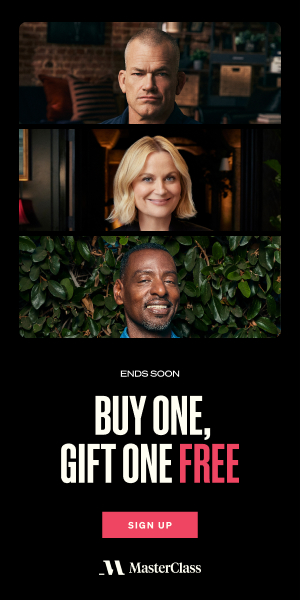In this review, we’ll see if the Alice Waters MasterClass on the art of home cooking lives up to its promises and delivers a course worthy of your time and money.
If you’re a sucker for farmers markets like I am, you might have heard of Chef Alice Waters and her famous restaurant: Chez Panisse. As I’ve said in other MasterClass reviews, I’m a bit of a home cook myself, and I’m always looking for ways to sharpen my skills.
When I found out Alice Waters had a MasterClass on the art of home cooking, I cleared my schedule over the weekend and binge-watched every lesson. Why? Because Alice Waters cooks by one simple philosophy: Buying the best and freshest ingredients doesn’t make you a great chef, knowing what to do with those ingredients does.
In this MasterClass review, you’ll learn:
What does this MasterClass promise?
How much does Alice Waters’ MasterClass cost?
What’s included in the Alice Waters MasterClass?
About the structure of the class
Key things I learned after taking the MasterClass
Things I liked and didn’t like about the Alice Waters MasterClass
Is Alice Waters’ MasterClass worth the money?
That’s what I was hoping to uncover while taking Alice Waters’ MasterClass. And goodness did she deliver. Call me a fanboy, but in this review, I’ll share with you what I learned from Waters, what I liked and didn’t like about the class, as well as other information to help you decide if this MasterClass is worth taking.
Let’s dive in.
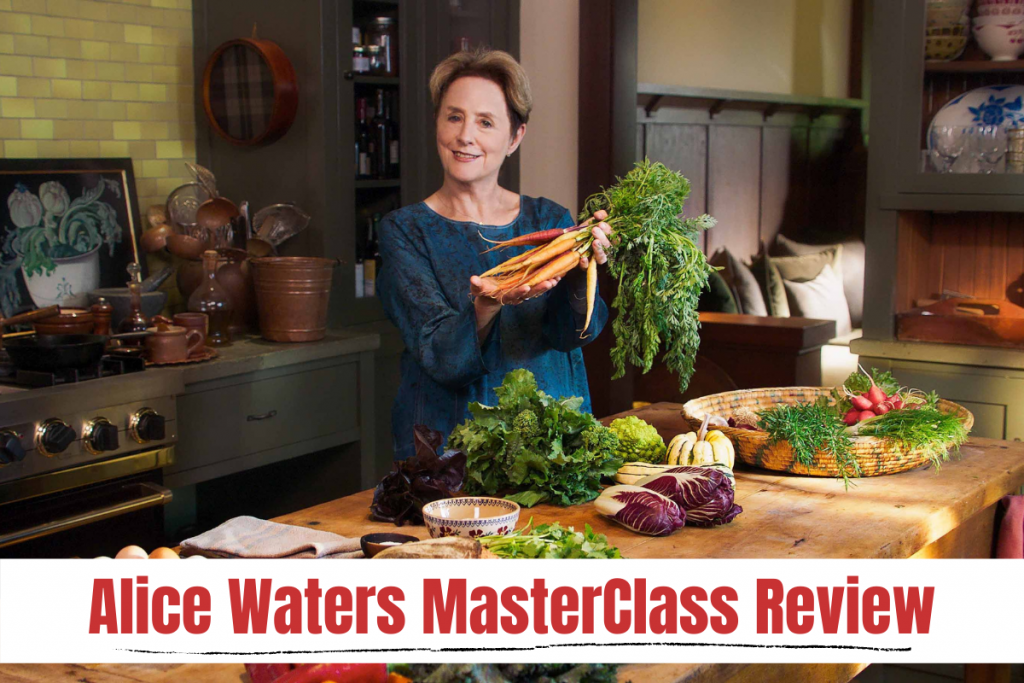
Quick Q and A
Yes. MasterClass charges a yearly subscription to access all of their courses. Jump to the pricing section to learn more.
The Alice Waters MasterClass on the art of home cooking is 3 hours and 47 minutes long and spans 17 video lessons.
Yes. If you cancel within 30 days of purchase, MasterClass will issue you a full refund.
Yes, if you are looking to simplify, yet improve your cooking at home, this class will teach you the essentials.
About Alice Waters
Alice Waters is a chef, restauranteur, and author who is best known for opening the world-renown Chez Panisse in Berkeley, California.
In 1971, when she was just 27 years old, Waters started Chez Panisse with film producer, Paul Aratow. The main reason for the restaurant’s founding was for Waters to entertain a few friends. But soon, the restaurant became well-known for its ever-changing menu based on seasonal and organic ingredients.
Alice and Chez Panisse are convinced that the best-tasting food is organically and locally grown and harvested in ways that are ecologically sound by people who are taking care of the land for future generations. The quest for such ingredients has always determined the restaurant’s cuisine.
Today, nearly 50 years later, Chez Panisse still stands because of its robust network of local farmers, ranchers, and dairies.
I think Betty Crocker wanted us to all buy her cake mix, and so she gave us the impression that it was difficult for us to do it at home.
Alice Waters
What does this MasterClass promise?
“Recipes are a framework,” says Alice Waters in her MasterClass trailer, “but the most important thing is the ingredient, where you find it, how you cook it, and how you will turn it into a beautiful meal.”
After taking Gordon Ramsay’s MasterClass on home cooking, it’s easy to see the different priorities among chefs. While Ramsay is more technique-driven, Waters is solely focused on one thing: ingredients.
Like all of the cooking MasterClasses, this one promises to help you become a better cook. However, Waters promises to do that by teaching you to:
- Know what food is alive and seasonal
- Buy food in a farmer’s market
- Let go of your over-dependence on recipes
- Meal plan and much more
So, did Alice Waters live up to her promises? Did she meet my expectations? I’ll cover that at the end of the review (skip ahead if you want to find out). But first, let’s talk about what’s probably on your mind:
How much does Alice Waters’ MasterClass cost?
If you want to take Alice Waters’ MasterClass, you have three options to choose from.
In 2021, MasterClass began testing alternative subscription models besides their original flat-rate annual membership. Eventually, they settled on a new cost-friendly three-tier MasterClass pricing model for their annual subscription:
- Individual – $120 per year (average $10 per month)
- Duo – $180 per year (average $15 per month)
- Family – $240 per year (average $20 per month)
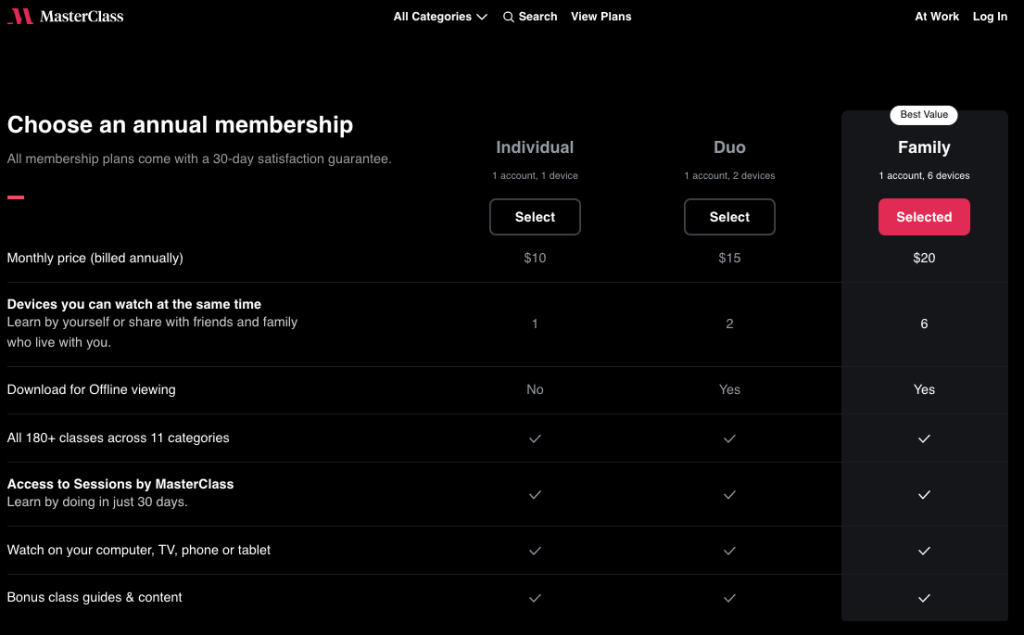
The Individual membership (formerly the “Standard Plan”) is perfect for single individuals who are most likely to consume online learning at home. The Duo (formerly the “Plus Plan”) and Family (formerly the “Premium Plan”) plans are better for couples as MasterClass allows multiple devices to watch at the same time. (Netflix has similar restrictions for their membership plans).
However, the ability to download video lessons for offline viewing is helpful for people who might want to watch MasterClass on their commute to work without eating up most of their data. The Plus and Premium plans offer their users the ability to do just that.
Personally, I go for the $120 per year option as I average about one MasterClass per month, which means my cost per class is $10.
The price may seem steep, however, the subscription gives you access to all 90+ MasterClass courses, including other notable chefs such as Gordon Ramsay, Thomas Keller, Massimo Bottura, and Wolfgang Puck.
Plus, you have to remember that each MasterClass is someone’s lifetime of work distilled into well-organized and enjoyable video content. In other words, if it turns out the Alice Waters MasterClass isn’t for you, chances are you’ll find other MasterClasses you do enjoy.
What is included in the Alice Waters MasterClass?
Here’s a rundown of what you are getting with the Alice Waters MasterClass.
| Runtime: | 3 Hours 47 minutes |
| Reviews: | 4.7 out of 5 ⭐️ |
| Lessons: | 17 video lessons |
| Materials: | 1 class cookbook |
Runtime
The runtime clocks in at just under 4 hours. However, if you are in a bit of a time crunch, you can easily watch the videos at 1.5x playback speed and finish in about 2 and a half hours.
Supplemental Material
Waters supplies her students with a downloadable class “cookbook” which is a hefty 77 pages long. If you are expecting the cookbook to be full of a bunch of her recipes, don’t kid yourself. Waters fills her cookbook with food philosophies and foundational guides to help you learn more about food. Like she promised, her goal is to have you rely less on recipes and more on intuition.

Community Access
Finally, like every MasterClass, Alice Waters’ has a community page called “The Hub” where you can interact with fellow home cooks. The Waters page isn’t particularly active; however, there are some good archived threads to read through for more information.
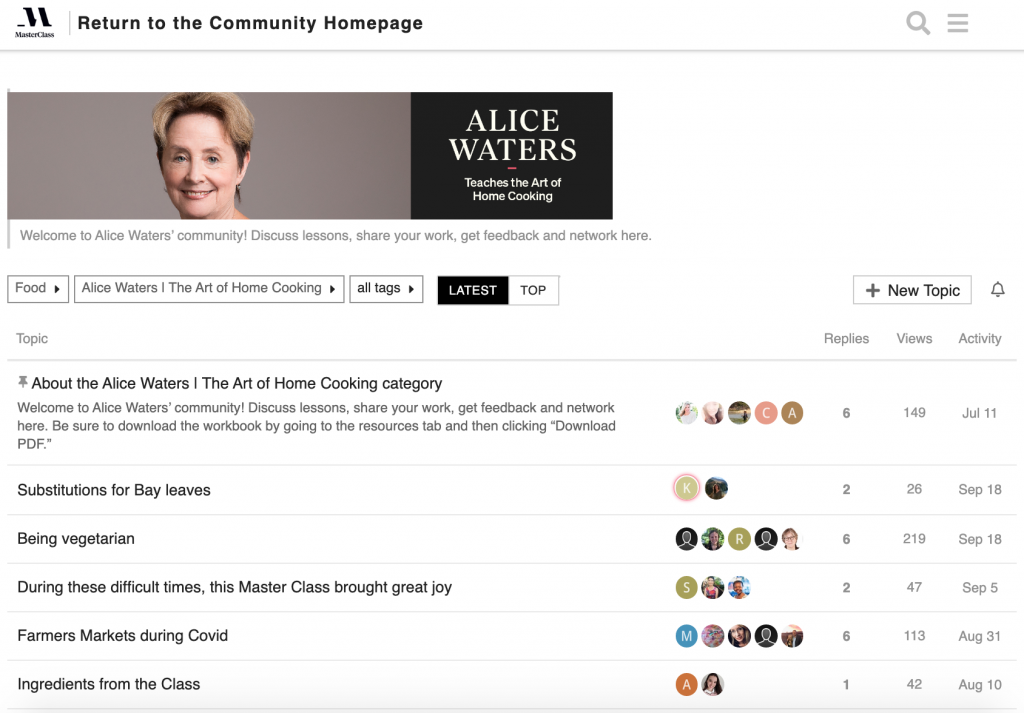
About the structure of the class
Alice Waters cooking MasterClass is 17 video lessons long with an average run time of 13 minutes per video. However, the video playback buttons offer you the ability to watch the course at 1.5x and 2x speed.
Lesson plan:
- Alice’s Philosophy of Food
- The Farmer’s Market: Learning From the Source
- A Vegetable Lunch: Roasted, Steamed, and Raw
- Alice’s Essential Kitchen Tools
- A Well-Stocked Pantry
- Cooking For Your Pantry: Alice’s Staples
- Leaves, Herbs, and Aromatics
- Cooking From Your Kitchen Garden: Salsa Verde
- Preparing a Beautiful Salad
- Chez Panisse Cooking: Galette
- Chez Panisse Cooking: Ravioli
- Follow the Rhythms of Nature: Seasonal Eating
- A Market Fresh Dinner: Planning and Prep
- A Market Fresh Dinner: Finish and Serve
- Coming Back to the Table
- The Power of Food: The Edible Schoolyard
- BONUS: Alice’s Egg in a Spoon
Lesson summary:
Alice Waters kicks things off with a basic overview of her kitchen tools and pantry. She spends a considerable amount of time covering her panty and talks extensively about olive oils. You may be tempted to skip over these introductory lessons; however, I can attest from my own culinary experiences that having a well-stocked pantry is vital to home cooking.
As Waters says, “How I stock my pantry allows me to cook in the way that I do, simply and yet with great depths of flavor and spontaneity.” Waters doesn’t see her pantry as a stuffy old cupboard. To her, a pantry includes her vegetable and herb garden, her frozen foods, even her oils and spices.
Side Note: I should mention that Alice Waters relies heavily on meatless ingredients. Of all her recipes included in the downloadable workbook, I counted only two with meat. They were both made with chicken. Alice isn’t a vegan or vegetarian but her recipes lean in that direction.
The MasterClass then moves onto covering simple recipes such as salads, doughs, and fresh pasta. Finally, Waters wraps up the class by covering her philosophy of seasonal eating and how to prepare a “Market Fresh” dinner.
My fast-track lesson plan
Although 4 hours of video lessons isn’t a huge time commitment, I created a fast-track collection if you are looking for an abbreviated lesson plan. In just over 90-minutes you can watch these lessons, get in the kitchen, and have a decent idea of what to do with it. I found these lessons to be the most impactful and beneficial to helping me learn the art of home cooking.
Course Reviewers 90-Minute Lesson Plan
5. – A Well-Stocked Pantry | 24m28s
11. – Chez Panisse Cooking: Ravioli | 15m48s
12. – Follow the Rhythms of Nature: Seasonal Eating | 15m06s
13. – A Market Fresh Dinner: Planning and Prep | 23m58s
14. – A Market Fresh Dinner: Finish and Serve | 15m30s
Total runtime = 1 hour 35 minutes
Key Things I Learned
I never had any “ah-ha” moments where I learned something completely new like some secret chef technique or rare ingredient only used in high-end restaurants. Instead, I learned simplicity.
I learned how salt, garlic, vinegar, and olive oil are all you need to dress a salad. I realized that homemade pasta is simple to make. I even discovered that pickling vegetables is much easier than you might think.
All in all, the biggest takeaway from this MasterClass is the realization that cooking well doesn’t take much besides understanding your ingredients.
Below are a few key learnings that stood out during the MasterClass:
- Your kitchen can be both useful and beautiful
- The most important tool in the kitchen is your hands
- When buying spices, always look for small, tight containers and avoid buying in bulk
- Don’t throw away overripe fruit, simply store them in the freezer and use them in homemade jams and jellies
To dive deeper, the next two sections cover what I specifically liked and disliked about Waters’ MasterClass.
Things I liked about the Alice Waters MasterClass
You know how some people are into ASMR videos? I think I can finally see why. Waters’ MasterClass is not only chock full of information, but it’s also relaxing to watch. Her voice and delivery are calm. Her aesthetic is beautiful. I felt neither distracted nor bored but rather inspired to get into the kitchen and start cooking.
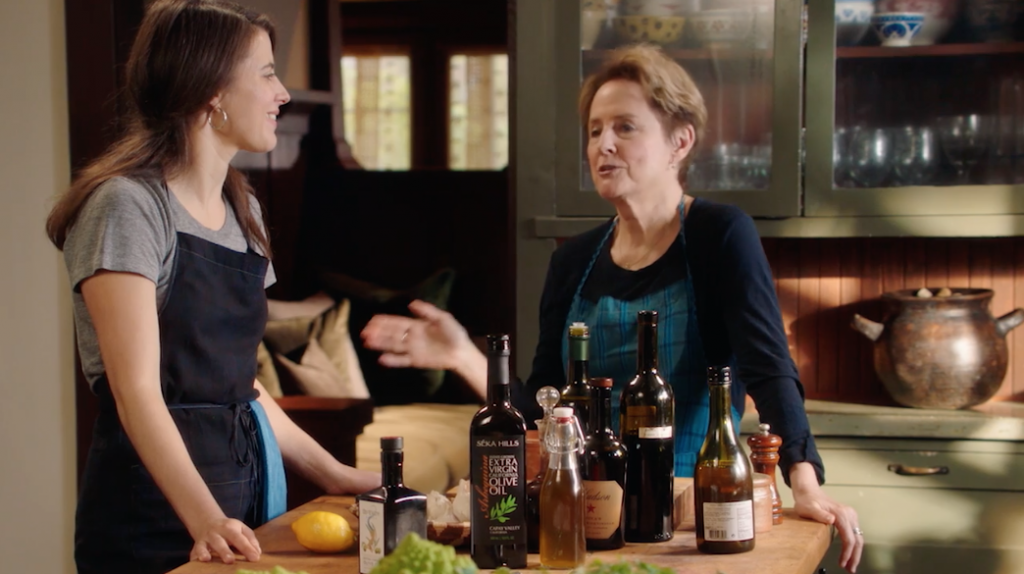
Another thing I learned that surprised me is about desserts. Alice made a simple dessert from homemade ricotta cheese (recipe included in the workbook), warmed honey, and toasted hazelnuts. She said she wants to move away from the traditional version of a sweet and heavy dessert to something that “piques your interest.” I never thought about dessert in this way.
Finally, I absolutely love Alice Waters’ philosophy on food. I, like many first-world citizens, am lucky enough to pop into a grocery store and pick out anything I want. I rarely think about what’s in season or what is freshest at the moment. After watching the class, I downloaded this app to help me learn more.
My favorite quotes from Alice Waters’ MasterClass
“If you are using things, every day, they should be both useful and beautiful.”
Lesson 4 – Alice’s Essential Kitchen Tools
“A lot of people really think that you have to do something fancy for dessert. I don’t want something really rich at the end of a meal. I want something that might be a little surprising, something sort of small in size but just piques your interest.”
Lesson 6 – Cooking For Your Pantry: Alice’s Staples
“I think Betty Crocker wanted us to all buy her cake mix, and so she gave us the impression that it was difficult for us to do it at home.”
LESSON 6 – COOKING FOR YOUR PANTRY: ALICE’S STAPLES
Things I didn’t like about the Alice Waters MasterClass
I did not have any personal qualms about Alice Waters’ MasterClass; however, I can anticipate a few complaints from students.
The first is accessibility. Many average home cooks don’t have the time or the means to go shopping at a farmers market a couple times a week. Many of us have to stock up for the week at Costco or Aldi, which means we aren’t getting the best of the crop. Therefore, some of the recipes that rely on fresh vegetables and ingredients might not turn out as tasty as Alice’s.
The second complaint I potentially see from people is the lack of meat. Waters is not a vegetarian, however, she is aware of her environmental impact in the kitchen. That’s why she utilizes the more eco-friendly, plant-based ingredients in the majority of her recipes.
The final potential complaint is that Alice advocates growing your own herbs and vegetables. However, she is blessed with California weather. At one point, she does mention it’s a small garden, measuring 10 feet by 10 feet. But I can see how this part isn’t feasible for many people.
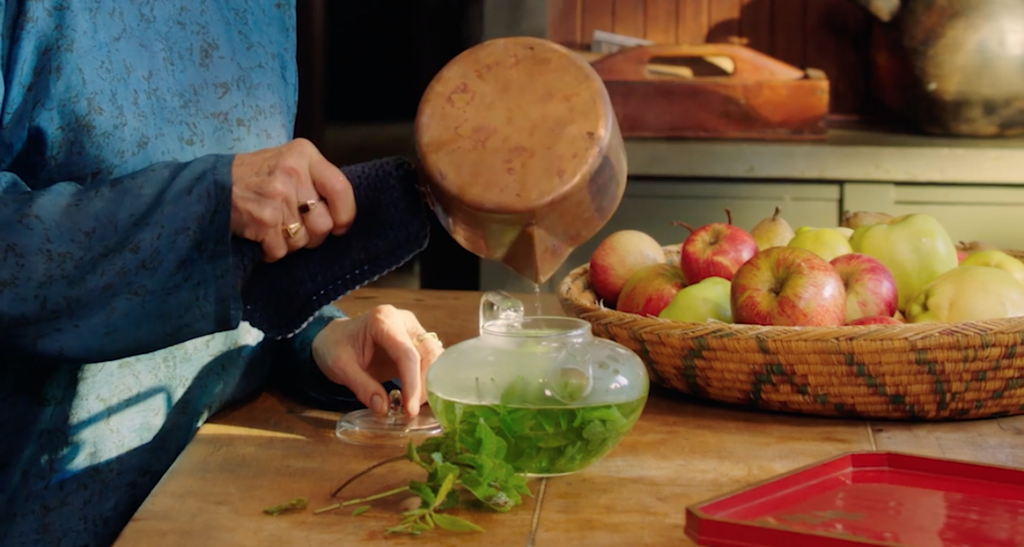
Does the class keep its promises?
Yes. One of the biggest promises Alice made that drew me to this course is being able to cook without a recipe. As I made my way through the MasterClass, I noticed how much Alice relies on taste and instinct to guide her. It obviously comes from years of experience in the kitchen, however, she made it seem less pretentious and more accessible.
I can honestly say that after watching this class I went into the kitchen and whipped up a fresh salad with a homemade dressing, all without a recipe.
And it tasted amazing.
Is Alice Waters MasterClass worth the money?
Yes if you…
- Want to learn the basics of home cooking
- Are inspired to cook more locally-grown food
- Are a fan of Alice Waters work
- Want to understand “seasonal cooking”
No if you…
- Don’t enjoy cooking at home
- Want to cook meat-heavy recipes
- Are looking for a course to cover advanced cooking techniques
Conclusion
Taking everything into consideration, I highly recommend this Alice Waters MasterClass. It’s calming, informative, and sheds light on specific areas in the kitchen I can improve upon, namely keeping things as simple as possible.
If you’re interested in learning more, here is a trailer to the class:


